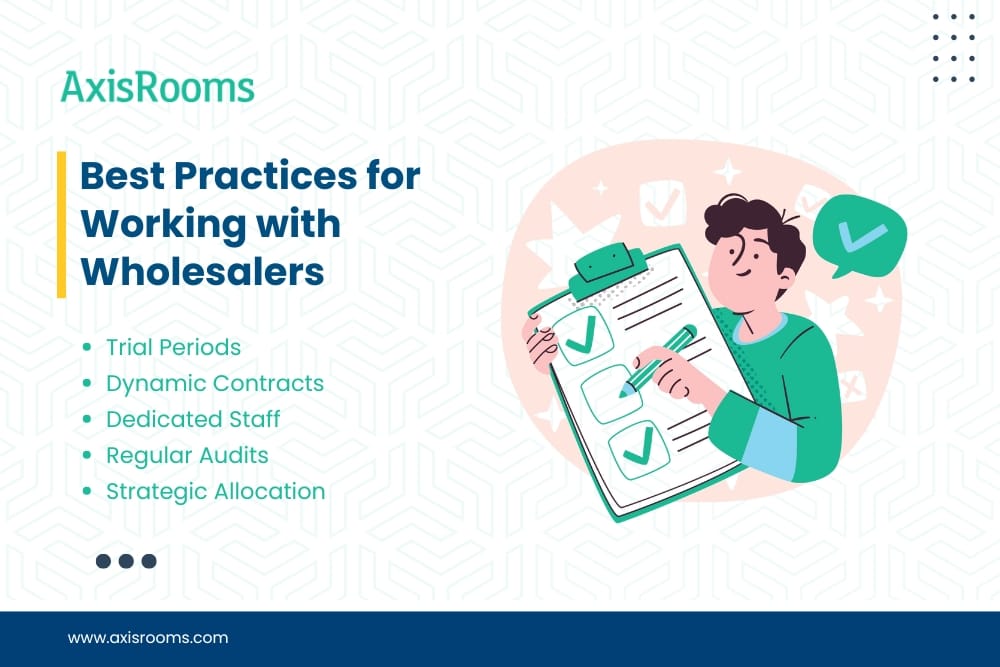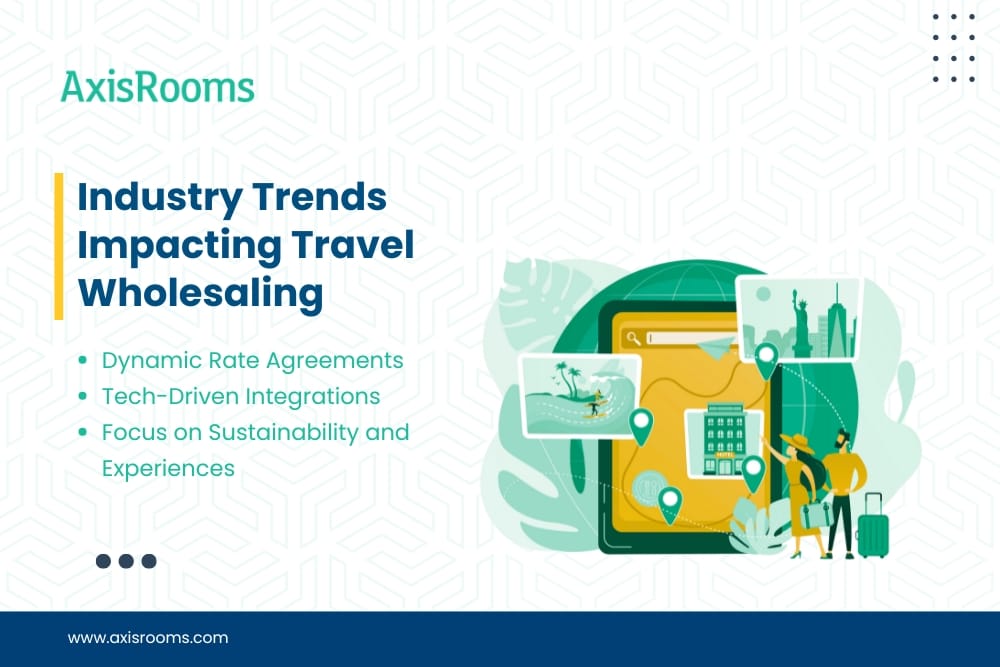Travel wholesalers are a critical part of the hotel distribution ecosystem. For hoteliers looking to maximize occupancy, reduce marketing costs, and increase international visibility, wholesalers can be valuable partners. However, working with them requires careful planning, the right technology stack, and a clear strategy.
This blog outlines what travel wholesalers do, why they remain relevant in 2025, and how hoteliers can best engage with them.
Why Travel Wholesalers Still Matter
Despite the rise in direct bookings and advanced channel management systems wholesalers continue to play a vital role.
Industry Data:
- According to Allied Market Research, the global wholesale travel market is projected to reach $399.4 billion by 2027.
- Phocuswright reports that wholesalers influence nearly 47% of global hotel bookings.
- As of 2025, the online travel industry is experiencing unprecedented growth, with the global OTA market now capturing 40% of total travel bookings worldwide.
- Despite economic uncertainties, projections show that most travelers globally are planning to take the same number or more trips in 2025 compared to 2024, with many expressing interest in exploring new destinations.
Strategic Benefits for Hotels:
- Guaranteed room allotments reduce last-minute inventory pressure
- Access to international and hard-to-reach customer bases
- Low upfront marketing costs for the hotel
Advantages of Partnering with Travel Wholesalers
- Increased Occupancy: Blocks of rooms are often pre-booked, ensuring higher baseline occupancy.
- Market Diversification: Reach guests from new source markets or specific segments (group tours, MICE, etc.).
- Predictable Revenue: Bulk contracts offer revenue visibility during low seasons.
- Reduced Operational Load: Wholesalers handle packaging, promotions, and reselling.
Challenges to Consider
- Lower Margins: Discounted wholesale rates mean less per-room revenue.
- Inventory Control: Hard to manage availability and parity across many distribution partners.
- Brand Inconsistency: Rates and branding may appear inconsistently on third-party platforms.
- Contract Rigidity: Static rate agreements may limit revenue optimization in high-demand periods.
Best Practices for Working with Wholesalers

- Trial Periods: Pilot test wholesalers before committing long-term.
- Dynamic Contracts: Use flexible pricing models that allow real-time rate changes.
- Dedicated Staff: Assign team members to monitor contracts, parity, and compliance.
- Regular Audits: Check for rate leakages and brand representation issues.
- Strategic Allocation: Avoid overcommitting inventory; balance direct and third-party distribution.
Industry Trends Impacting Travel Wholesaling

1. Dynamic Rate Agreements
More hoteliers are adopting dynamic pricing strategies with wholesalers, linking rates to real-time demand and availability via integrations.
2. Tech-Driven Integrations
Wholesalers are increasingly connected via API to channel managers and property management systems, allowing automated inventory sync. This reflects the growing demand for robust OTA integrations that ensure up-to-date pricing and room availability across platforms.
3. Focus on Sustainability and Experiences
Wholesalers are now prioritizing hotels with eco-certifications and unique experience offerings to meet traveler expectations.
Product Focus: AxisRooms Channel Manager
For hoteliers, this means:
- Centralized rate and inventory updates: Any change made in the system is instantly reflected across all sales channels, eliminating the need for repetitive manual updates.
- Fewer overbooking risks: Real-time inventory synchronization helps prevent double bookings and improves guest satisfaction.
- Better control over channel performance: The dashboard provides detailed insights into the productivity of each distribution partner, helping hoteliers identify which wholesalers or OTAs drive the most bookings and revenue.
The system enables hotels to monitor wholesaler productivity, enforce rate parity, and allocate inventory strategically. Its compatibility with PMS integrations also streamlines operational workflows, reducing manual errors and improving room availability accuracy.
Top Travel Wholesalers
Is It Right for Your Hotel?
Wholesalers are best suited for:
- Large hotel groups or independent properties with high inventory:Wholesalers are ideal for hotels that have a large number of rooms to fill regularly, as they can offload bulk inventory quickly and maintain high occupancy levels.
- Hotels seeking international exposure without direct marketing: Partnering with wholesalers gives hotels access to global distribution channels and international travelers without the need for extensive marketing campaigns or overseas sales teams.
- Properties in destinations popular with group tours or package holidays: Hotels located in areas frequently visited by tour groups or included in vacation packages can benefit from the steady demand and block bookings facilitated by wholesalers.
- Smaller boutique hotels focusing on direct bookings or luxury clientele: These properties may gain more by maintaining control over pricing and guest experience through direct booking strategies or by joining exclusive, high-end travel networks tailored to their brand.
What Are Travel Wholesalers?
Travel wholesalers, also known as bed banks or accommodation consolidators, are B2B entities that purchase blocks of hotel rooms at negotiated rates. They then redistribute this inventory to:
- Online Travel Agencies (OTAs)
- Retail travel agents
- Tour operators
- Destination management companies (DMCs)
Wholesalers typically bundle hotel inventory with other travel services (e.g., transfers, activities) to create comprehensive packages sold to end travelers.
How Do Travel Wholesalers Work?

- Bulk Purchasing: Travel wholesalers negotiate with hotels and other service providers to purchase large volumes of room inventory at discounted rates, which can be either static (fixed) or dynamic (fluctuating based on demand). This bulk buying power allows them to secure favorable pricing and guaranteed availability.
- Distribution: Once inventory is secured, wholesalers distribute it through a broad B2B network that includes online travel agencies (OTAs), tour operators, and retail travel agents. These partners access the inventory via integrated platforms or booking systems to offer to their customers.
- Resale: The inventory is ultimately sold to end travelers through these intermediaries at a higher retail price, with each party adding a markup to cover costs and earn profit. This model ensures a scalable distribution system while maintaining competitive pricing for consumers.
Conclusion
Travel wholesalers remain vital to the hotel distribution mix. They provide reach, scale, and predictable business for hotels willing to engage with them strategically. However, to fully leverage wholesaler relationships, hoteliers must invest in robust channel management, negotiate dynamic agreements, and continuously monitor performance.
Incorporating travel wholesalers into your hotel marketing strategy allows for diversified sales channels, enhancing resilience during market fluctuations. For properties aiming to grow occupancy and reduce operational burden, travel wholesalers—when properly managed—can be a highly effective distribution partner.
To learn how AxisRooms Channel Manager can help manage your wholesaler network, schedule a demo with our team today.


